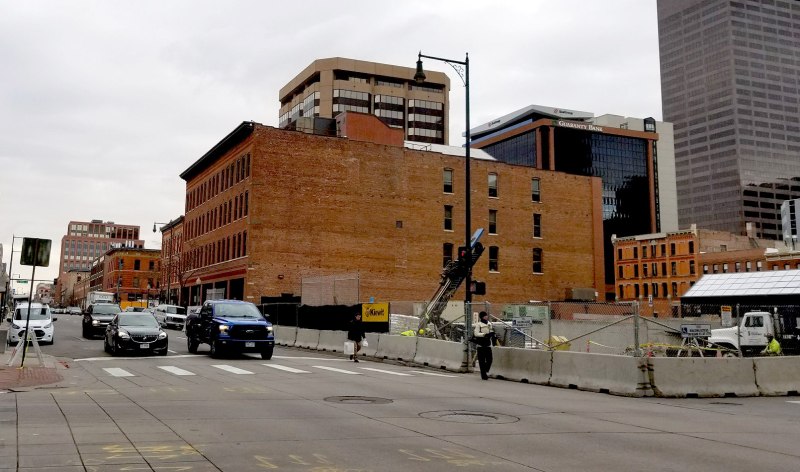Walking Around Construction Projects Shouldn’t Be So Dangerous and Demeaning
Denver Public Works is looking to change its rules for construction permits, and the Mayor’s Pedestrian Advisory Committee is pushing the department to guarantee better conditions for pedestrians.

Navigating Denver’s streets on foot can be a maddening experience, especially when sidewalks are closed for months and sometimes years at a time to make room for construction. While other cities have policies in place to minimize the impact of construction on the pedestrian network, in Denver detours routinely force people on foot to zig-zag through city streets.
Now Denver Public Works is looking to change its rules for construction permits [PDF], and the Mayor’s Pedestrian Advisory Committee is pushing the department to guarantee better conditions for pedestrians.
The problem
There is no city rule that prevents contractors from blocking sidewalks without providing a temporary walkway. Instead, builders simply pay the city a fee for a permit to block the sidewalk. The cost for the permit varies by neighborhood and time of day.
While DPW says temporary walkways are “preferred,” the only incentive is a 10 percent discount on the permit fee. And that doesn’t even apply in the rapidly developing Central Business District or in Cherry Creek.

As a result, temporary walkways during construction projects are rarer in Denver than other cities. People on foot don’t get to take direct routes — they have to go out of their way and make extraneous crossings. Or they take their lives in their hands, walking on the street next to speeding cars.
“The general issue is that it’s unsafe for pedestrians in construction zones,” said Lynne Brown, an MPAC member. “No accommodation has been made to route them safely so that they have a more direct way to go, rather than going sometimes a block or two out of their way. If you’re trying to increase pedestrian traffic, then you don’t cut people off on these downtown streets.”
The solution
MPAC Chair John Hayden laid out the group’s recommendations for the new policy in a letter to the streets department [PDF]. It lists seven demands, including a requirement for builders to include a direct substitute pedestrian passageway — made with Jersey barriers or “shed roof walkways” — by default.
“If a detour is necessary, it shall be the responsibility of the applicant to prove why direct safe passage is not necessary,” Hayden states. “As we understand it, this would be a reversal of current policy that now states city staff must determine if a direct pedestrian passage is to be required rather than a detour.”
The letter includes diagrams showing how the city’s current policy obstructs pedestrian movement, and how the city should create continuous paths for people on foot, in wheelchairs, and on bikes.

DPW is working with a consultant on a draft of the new rules, DPW spokesperson Nancy Kuhn said, but the revision process “could take several months.”


